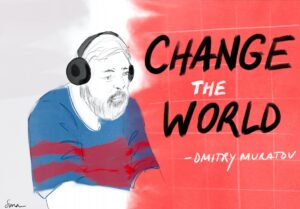Citizen Journalist
“…to change the world for the better.”
December 16, 2021[Graphic: Smaranda Tolosano]
Global Investigative Journalism Network
#GIJN
Nobel Winner Muratov: Be an Investigative Reporter, and Fight for a Better World
By Rowan Philp
“Asked why young people should become investigative reporters, Muratov’s response was simple: to “change the world for the better.”
In his acceptance speech for the Nobel Peace Prize, Dmitry Muratov, editor-in-chief of Russia’s leading independent outlet, Novaya Gazeta, said: “The award today goes to the entire community of investigative journalists.”
Four days later — in a webinar interview with GIJN — Muratov set out the true stakes for investigative journalists with whom he shared that high honor: “Investigative journalism is the most important mission for humankind, because investigative reporters are not letting people steal the future from us.”
“At the time of his interview with GIJN, Muratov was visiting radio journalism colleagues in his birth place — the town of Samara, on the Volga River.
Asked whether the international spotlight of the Nobel Peace Prize afforded independent media in Russia some added protection against state persecution, Muratov said he didn’t know. However, he said the award had transformed Novaya Gazeta into a perceived sanctuary for civic problems.
“There’s much more work for me now, because I personally get hundreds of emails — people are requesting help with medicine, court hearings, apartments, and childhood diseases,” he said. “This award has turned into a new job for me, and, to be honest, I’m happy with that.”
Muratov said the impact from investigative reporting — from fired officials to changed policies and influencing voters — is not only important for improving lives, but also for preserving the careers and energy of the journalists.
For Muratov, the talent and motivation for effective watchdog reporting is likely already present in many autocratic societies — and said young people in authoritarian countries should consider that their talents might be wasted in government service. The key, he says, is for journalists to have each other’s backs.
“It’s solidarity,” he said. “What is my hope? — I hope to cooperate with the international network of investigative journalists, like GIJN.”
“…building a public infrastructure where everyone is trained to “commit acts of journalism.”
Darryl Holliday, co-founder of and director of the news lab at City Bureau, a civic journalism nonprofit in Chicago
He writes: “The solution to the current crisis in journalism isn’t simply to save jobs, but to willingly and intentionally democratize the means of journalistic production.” Holliday’s vision is one of faith: in the potential of journalism, and the idea that our fellow community members want to join in. “The profit-driven side of local journalism may be in freefall, but infrastructure for a more public, participatory, community-driven, trustworthy, accurate, and representational news ecosystem is readily available.”
Holliday’s vision is one of faith: in the potential of journalism, and the idea that our fellow community members want to join in. “The profit-driven side of local journalism may be in freefall, but infrastructure for a more public, participatory, community-driven, trustworthy, accurate, and representational news ecosystem is readily available.” And in the end, what other choice do we have?
—Savannah Jacobson, story editor
Journalism is a public good. Let the public make it.
Ivory-tower journalism has failed. It’s time we focus on building public infrastructure where everyone can find, factcheck, and produce civic information
